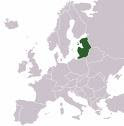
When I first came to Poland there was a lot of talk of tigers, namely Celtic and Baltic tigers. Regional neighbours in the Baltic States and Slovakia, with very liberal regulations and flat taxes, were seen as a model for Poland to emulate. During the last election one of victorious PM Donald Tusk's main promises was to turn Poland into the 'next Ireland'
Of course, we all know what happened next. Following Cliff's law of gravity-- the harder they come the harder they fall-- countries like Latvia, Eire and Slovakia which were enjoying high rates of growth in the good times quickly found the bad times hard going indeed. Anyway, enough from me: here is a real blogger, Łukasz Foltyn, with his take on things....
Evidence that the supporters of neo-liberal economics use demagoguery and lies to win public support for their position is to be found in the crisis of the Baltic States. Not so long ago these economies were held up as a model for high economic growth which liberals attributed to their liberalism-- in particular a flat tax rate. Among advocates of the 'Baltic Tigers' were Leszek Balcerowicz-- the architect of Poland's economic transition and Poland's leading neo-liberal guru. The current crisis, which has seen GDP fall nearly 20%, proves one of two things: 1) That liberal reforms which were responsible for the growth are responsible for the subsequent recession, or 2) that neither growth nor recession were connected to liberalism, in particular with tax cuts or flat tax rates. The second option is better for liberals, although still embarassing for its propagandists. Either they have no idea about how to run an economy--claiming that a flat tax rate led directly to high growth--or they simply decieved the public. It is hard to say which is worse but maybe I'll choose ignorance.....
Growth in the Baltic States was fuelled mainly by foreign investors, mostly on credit. Now, when the sources of credit are drying up due to loss of confidence in eastern European markets, the economies are collapsing. Now we can compare the previous growth with the current recession: Liberalisation and flat tax rates, had nothing to do with the growth (or very little) However, when the global crisis reached the Baltic, liberalism enabled the sudden flight of credit, especially in the form of currency. Restrictions on credit withdrawals were eliminated in the name of "freedom of market decisions" and low taxes led to more consumption rather than investment, as well as making it impossible for the national budget to benefit from the 'good times.'
These facts should compromise Polish liberals, as should the case of the Republic of Ireland: The most liberal economy of the 'old EU', and now suffering the most from recession amongst those countries. Unfortunately, I don't believe that the liberal authorities--"economic experts who know the best way to fast growth"-- will be in anyway affected.. There was Ireland, then the Baltic countries, now they'll find a new model country which currently has low taxes and high growth rates. Then, once again, they will repeat the mantra that the low taxes caused the high growth. Here in Poland, no-one speaks out against this view. Why should they? "Even children in nursery school" know that "flat taxes are good for everything."
Łukasz Foltyn is a blogger on lewica.pl.
Translated (roughly) by Czarny Kot 30/06/09 Source: lewica.pl
1 comment:
blogwalking
Post a Comment